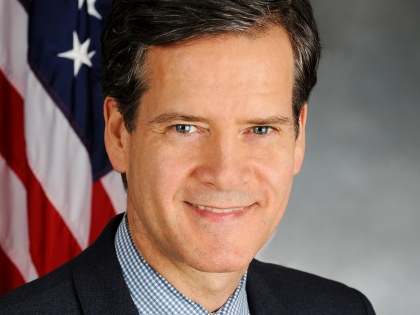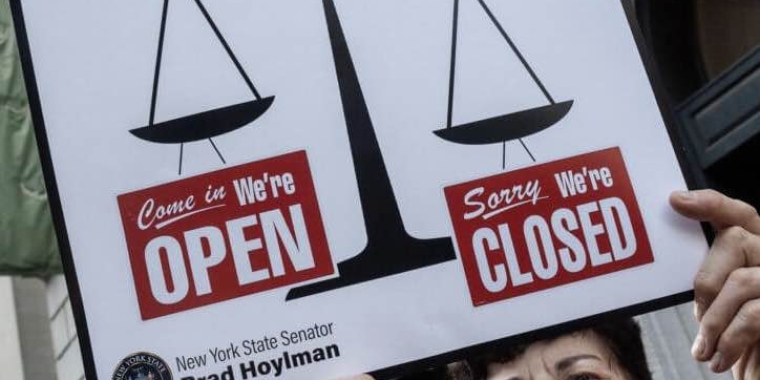
Elected Officials Hail Expansion Of Midtown Community Court Proceedings To Address Quality Of Life Crimes And Recidivism
March 16, 2023

NEW YORK — Elected officials, community leaders and legal advocates are hailing a decision by the NYS Office of Court Administration (OCA) to expand the operations at Midtown Community Court (MCC) by an additional day beginning today, March 16. MCC is the nation’s first community court and a joint effort of OCA and the Center for Justice Innovation (CJI).
For several months, a working group convened by Senator Brad Hoylman-Sigal (D-WFP, Manhattan), Chair of the Senate Judiciary Committee, and consisting of local elected officials, representatives from OCA, CJI, the Manhattan District Attorney and the defense bar, met to create a plan to broaden MCC’s jurisdiction so in-person court operations occur more days each week. These efforts build on successful advocacy efforts to partially reopen MCC for the first time since the beginning of the pandemic, which included a letter to OCA leaders and a press conference demanding MCC’s reopening.
Senator Hoylman-Sigal said: “Without a fully functional Midtown Community Court, we’re fighting quality of life crimes and recidivism with one hand tied behind our back. I’m elated that our efforts paid off and MCC will soon open their doors an additional day — especially since MCC’s data-proven methods help reduce recidivism and improve quality of life. I thank Acting Chief Administrative Judge Amaker, District Attorney Bragg, the Center for Justice Innovation, and the Legal Aid Society, along with my colleagues Congressman Nadler, Borough President Levine, Assembly Members Rosenthal and Simone, Council Members Brewer and Bottcher, for collaborating on this important issue.”
Hon. Tamiko Amaker, Acting Chief Administrative Judge of the New York State Courts, said: “I am extremely pleased that the Midtown Community Court is further expanding its capacity to better serve the community. The mid-Manhattan court has a proven record of improving public safety and the quality of life within the community, providing diversion programs and critical services to low-level offenders to help break the cycle of crime and put them on a path to productive, law-abiding lives. I am thankful to Judge John Zhuo Wang for his steadfast dedication and to the Court’s numerous partners and stakeholders for their ongoing commitment to, and support of, its important mission.”
Congressman Jerry Nadler said: “I am heartened to see the successful efforts of the advocates and local elected officials have resulted in an expansion of in-person operations at the Midtown Community Court (MCC). As I have said, the MCC is one of the best tools New York City has to divert low level offenders in the criminal justice system by providing creative, restorative sentencing alternatives. With this additional day of operations, New Yorkers will be better able to access the crucial justice resources and social services that the MCC provides to the community.
Manhattan Borough President Mark Levine said: “The Midtown Community Court is proven – by outside evaluators – to stem recidivism by addressing the root causes of crime, so every day the Office of Court Administration waits to reopen MCC full time robs New Yorkers of community-oriented justice solutions and quality-of-life improvements. MCC turns offenders’ lives around and provides critical support services that reduce crime, so reopening MCC must be OCA’s top priority.”
Assembly Member Linda B. Rosenthal said: "As history has demonstrated, incarcerating people for crimes of poverty and low-level drug offenses is not the answer. For years, Midtown Community Court has tirelessly worked to connect people accused of low-level crimes to emergent services and diversion programs as a way to thoughtfully reduce recidivism and improve quality of life conditions. However, pandemic-related closures have left the most vulnerable in our communities without much-needed intervention. We depend on Midtown Community Court to battle the systemic inequities that plague our criminal justice system, while keeping our streets and neighbors safe. I am thrilled that MCC is expanding their hours, and I, along with the community and my colleagues will continue to advocate for a full reopening. c."
Assembly Member Tony Simone said: “The Midtown Community Court has been proven to reduce crime and incarceration. Expanding court hours is a significant step towards improving local quality of life issues and bringing important services back to the neighborhood.”
Council Member Gale A. Brewer said, “MCC is one of the nation’s first community courts and has helped countless New Yorkers stay out of jail and out of trouble since 1993. Thank you Senator Hoylman-Sigal for your leadership on this issue.”
Council Member Erik Bottcher said: “I’ve been proud to stand alongside Senator Hoylman-Sigal and our colleagues to return MCC’s invaluable services to our community. I’m grateful for his leadership and the engagement and commitment from our community members who have made their voices heard on this issue.”
Under the expansion plan, MCC will now preside over cases in which youth offenders are issued a desk appearance ticket anywhere in the borough, and it will also hear additional mental health court cases referred from Bellevue beginning March 16.
Over the last quarter century, MCC’s model of problem-solving justice has led to effective responses to low-level crime, contributing to drops in both crime and use of jail. MCC connects people accused of low-level offenses – such as shoplifting, drug possession, and prostitution – with services and diversion programs that can address the root causes of crime and reduce recidivism. Reopening MCC full time will help improve access to justice and quality of life for all New Yorkers.
New York needs MCC to operate at full capacity to help strengthen our justice system and solve our most persistent community problems. The Court sentences low-level offenders to perform community restitution, and links them to on-site social services like drug treatment, job training, and mental health counseling in order to address underlying problems, such as homelessness, unemployment, and substance abuse. Their mission is to give offenders innovative and tailored support to avoid repeat offenses.
Lisa Rivera, President and CEO of New York Legal Assistance Group, said: "As an organization fighting for fair and equal access to civil legal services for New Yorkers experiencing poverty, NYLAG supports the NYS Office of Court Administration’s decision to expand operations of the Midtown Community Court (MCC) by an additional day. MCC and the City's other community courts provide vital, local access points for New Yorkers seeking legal services within their communities, and help to remove barriers to justice for New Yorkers who are most in need. We commend Senator Hoylman-Sigal and the working group for planning this expansion of MCC’s operations and for prioritizing legal access in our neighborhoods.”
Courtney Bryan, Executive Director of the Center for Justice Innovation, said: “With the collaboration of the New York State Unified Court System and our partners in and outside government, the Midtown Community Court has been able to reduce the use of incarceration, improve safety, and help New Yorkers get the help they need to lead safe and healthy lives. Through a dedicated judge, court team, onsite clinic and non-court programs, the Midtown Court is providing invaluable support five days a week. Now, with the courtroom open a second day every week, we can help even more people get the counseling, education and other vital assistance they need to achieve success and avoid the negative collateral consequences of justice system involvement.”
###